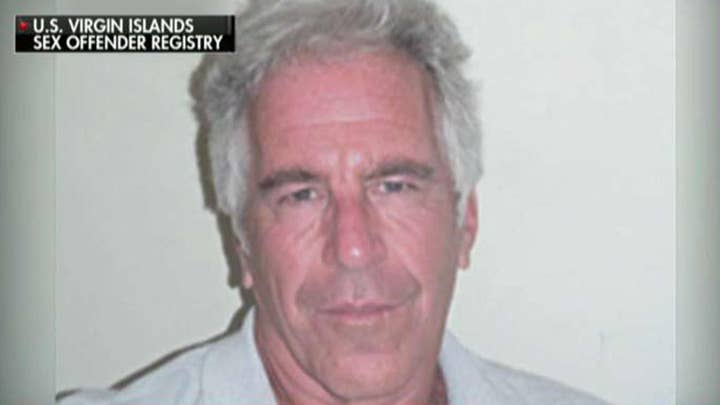Medical examiner says Jeffrey Epstein's official cause of death is still pending
Autopsy reportedly finds multiple broken bones in Jeffrey Epstein's neck; Bryan Llenas reports.
Amid the fallout from the death of Jeffrey Epstein – compounded by sharp questions as to why he was able to live such a lavish and unencumbered life despite being a registered sex offender – scrutiny has turned to the Dru Sjodin National Sex Offender Public Website, its discrepancies and its lack of uniformity given different rules implemented by different states. According to the Department of Justice, the National Sex Offender Public Website’s information is provided by the jurisdictions’ registries, thus any discrepancies or lack of uniformity is due to discrepancies and/or differences at the jurisdiction level.
Nonetheless, such cracks may have long been exploited by the disgraced financier may have exploited.
“Jeffrey was able to get around some of the registration requirements because he claimed his residence was in the Virgin Islands and his plea deal allowed him to take advantage of a loophole in New Mexico,” Cheryl Bader, a former federal prosecutor who teaches criminal law at Fordham Law School, told Fox News. “The national registry is a compilation of information, so its accuracy depends on how compliant each jurisdiction is with maintaining and updating records.”
States and the federal government historically have grappled over the most effective way to shield the public from sex crime violators. In 1994, Congress passed the Wetterling Act which mandated all states set up sex offender registries. Two years later, the bill was amended to include Megan’s Law, which commanded such information to be made public. Each state was left to decide what information to make public based on what authorities deemed necessary to uphold public safety.
'ORGY ISLAND' TO AIRPLANES, EPSTEIN'S ASSETS ARE UP FOR GRABS
Federal law has divided convicted sex offenders into three categories. Federal law categorizes an offender based on the crime of conviction. Tier one generally has mandated a 15-year registration period, with tier two and tier three violators cataloged 25 years and life, respectively. In 2006, the Sex Offender Registry and Notification Act (SORNA) purported to close existing discrepancies between states by establishing a national standard, with states threatened with the loss of federal funding for failing to comply.

The Manhattan home of Jeffrey Epstein, in a photo taken last month. (AP Photo/Bebeto Matthews, File)
However, several states have pushed back against such standards -- and in some cases, the auditing processes have been tied up in red tape and lack of oversight. And, according to Bader, despite the national standard, “jurisdictions have different rules in place about registration requirements, notification of address change and whether neighborhood residents will be proactively notified.”
“Many states require lifetime registration, others are laxer and less compliant with updating records and notifications because of the economic cost,” she added. “Other states prefer individualized risk assessment tools to the rigid standardized federal methodology.”
SORNA requires sex offenders to check in annually with a new photograph if their appearance has changed. Tier two offenders are required to check in twice per year, and tier three is mandated to check in quarterly. DNA samples are collected at a registrant's first check-in. SORNA requires changes of address to be reported within three days and does not include or address in any way residency restrictions. Any residency restrictions are placed on offenders are imposed at the state, tribal, county or municipality level. Most jurisdictions generally ban offenders from living near parks, schools or places where children congregate.
Failing to heed to the reporting conditions would be considered a felony and even first-time violators. SORNA requires jurisdictions to include a maximum penalty of greater than one year for failing to report. Still, Epstein – with his big bucks and powerful posse of lawyers – was able to skirt the system even as a "tier three" offender.
“Jeffrey Epstein was labeled a level one offender in both Florida and the U.S. Virgin Islands, but a level three in New York and there are still many questions regarding the role of his power and money in avoiding responsibility,” noted Melissa Jampol, a former sex crimes assistant at the Manhattan District Attorney’s Office. “And the impact of states applying the law differently is that the value of the offender status labeling is applied disparately and not uniformly.”
In 2008, Epstein entered into a plea deal rather than face trial for sex crimes in Florida. He served 13 months in county jail and was directed to register as a sex offender -- but avoided all federal charges. Or at least, Epstein did up until this past July, when the FBI apprehended him at New Jersey's Teterboro Aiport and accused him of trafficking minors for sex.
Epstein never once checked in with the New York Police Department (NYPD) despite state law requiring he personally verify his address every 90 days. After Epstein was informed that he needed to enlist in New York state's program because he maintained a home in Manhattan, the financier made his primary residence one of his private islands in the Caribbean and listed New York as a “vacation” property ahead of the first scheduled check-in. Thus, his monitoring structure became murky and no longer fell into New York’s realm of responsibility, the NYPD has since argued.

Jeffrey Epstein and friend Ghislaine Maxwell in 2005. Epstein signed a plea deal in 2008 rather than face trial. (Joe Schildhorn/Patrick McMullan via Getty Images, File)
In Florida, he registered, listing vehicle information for some 29 items ranging from multiple Mercedes-Benzes to Jeeps, Chevrolets, a Rolls Royce, a Bentley and Harley Davidson motorcycles. But, in New Mexico, where Epstein spent more and more time, the convicted offender was not required to enter the system at all. This was because the victim Epstein confessed to abusing in Florida was 17 — the age of consent in New Mexico.
Since Epstein’s arrest last month, New Mexico Attorney General Hector Balderas has embarked on a campaign to change state law to ensure that any person with a sex-trafficking conviction registers in the state.
But New Mexico is not the only state whose sex offender registry is rife with irregularities. But, the registry has been rife with irregularities.
CBS Chicago reported this week that many photos of convicted sex offenders weren’t being uploaded to the Illinois online registry, and some photos showed the wrong people. In the case of at least one offender, mug shots from 2019, 2016, and 2009 were posted on the registry, but each mug shot showed a different person.
In many states, Fox News found, mugshots were uploaded sporadically and routinely skipped years or were out-of-date by up to four years.
People in several states also have bemoaned an array of other escape clauses – including unclear instructions as to whether offenders can live near bus stops or near youth camps without restriction. Residency restrictions are not imposed on a federal level, but determined by state and local levels.
Moreover, the double-edged sword of homelessness was known to be especially commonplace among sex offenders – who routinely have battled to find adequate housing and employment given their red-flagged status, cannot adhere to the law properly without a known address.
This week, outrage bubbled up in Boston after Wayne Chapman, a 71-year-old convicted child rapist, was released from prison. Chapman had spent decades behind bars for sexually assaulting up to 100 young boys, and his registration listed his address as being "on the street." His attorney has since stated that the ailing man was being treated at an undisclosed medical facility.
Then there's the point of contention over the national registry and nursing homes across the country.
Last month, WKBW Buffalo revealed that Charles Mitchell, who was convicted of committing rape at knifepoint three decades ago – had moved to the Newfane Rehabilitation and Health Center in January. While Mitchell was registered as a risk-three “sexually violent offender” with a street address that matched the facility – although the nursing home name was not provided on his profile – New York law did not require nursing homes to inform other residents and his status went unbeknownst to others.

Outrage grew in Boston after 71-year-old convicted child rapist Wayne Chapman was released from prison and subsequently was listed as “on the street” on his registration. (Massachusetts Sex Offender Registry)
Two years ago, another nursing home in Buffalo came under fire after a known sex offender allegedly sexually assaulted a woman there.
WAS JEFFREY EPSTEIN'S DEATH SUICIDE OR HOMICIDE? DR. SIEGEL SAYS ONE APPEARS 'MORE LIKELY'
Nonetheless, New York is hardly alone. Most states do not require nursing homes to disclose a resident's sex offender status to others. California, Idaho, Illinois, Louisiana, Minnesota, North Dakota, Ohio, Oklahoma and Virginia have passed bills ordering such notifications.
Some critics have argued the sex offender registry program has deprived Americans of the right to due process and to avoid double-jeopardy, with the regular check-ins functioning as a means of ongoing punishment.
“The requirements necessary to successfully comply with registration are all but impossible, and certainly not helpful to those trying to maintain employment and find stable housing,” said Jessica Kelley, a government-affairs specialist at the Washington free market-centered think tank R Street Institute. “The registry should almost certainly be a policing tool, but the public component is not necessary. Its continuing punishment can only be vindictive, and many of these first-time offenders are on the registry for non-violent crimes like public urination.”
Kelley underscored that there was a crucial distinction to be made – sex offenders who acted out more than once were most likely to return to criminal activity.
A DOJ-funded study found that “treated” offenders – those who had completed targeted rehabilitation programs – had a mean sexual recidivism rate of 10.1 percent. For those without treatment, the recidivism rate hovered around 13.7 percent.
The rates were 11.1 percent for treated sex offenders and 17.5 percent for untreated sex offenders based on an average follow-up period of slightly over five years.
CLICK HERE TO GET THE FOX NEWS APP
Critics also say that the registry ultimately provides communities with a false sense of security.
“Most sexual offenders are never listed in the registry because the victim knows them and is too scared to come forward. Sexual abuse is a very underreported crime,” added Andrea Powell, the founder of human trafficking survivors’ advocacy group Karana Rising. “Thus, the registry is not capable of doing what it intended to do, which is to keep people safe from offenders.”




